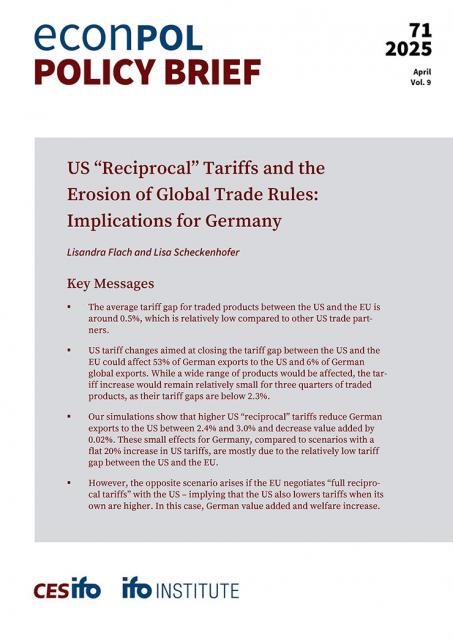News Archive

International Transmission of Interest Rates: The Role of International Reserves and Sovereign Debt
|
Working Paper
| News
In this study of the determinants of international transmission of interest rates with a special emphasis on the role of international reserves and government debt, authors confirm that the trilemma still holds. They find significant spillovers from the U.S.

The Advantages of the Division of Labour Also Apply to Economic Policy: The Green New Deal
|
EconPol Opinion
| News
Even in times of the corona pandemic, environmental and climate protection are among the dominant topics in the economic policy debate:this is justified, as global warming is one of the greatest challenges of our time. Tackling it requires a transformation of the economy by reducing CO2 emissions and adapting to the climate change that has already occurred or will occur despite all efforts. European policymakers have set out to drive this transformation under the banner of the Green New Deal, its objectives shared by a large majority of the population.

The Deserving and the Undeserving: “Heuristics” or “Automatism”?
|
Working Paper
| News
Voter attitudes towards the welfare state, its specific programs, or specific people who are supposed to “benefit” from the implied social transfers have always been of vital interest for discussions in the public and political spheres. In this working paper, Peter Grand and Guido Tiemann (EconPol Europe, IHS Vienna) examine public sentiments concerning the conditionality of unemployment benefits and find that opinion is influenced by the supposed level of 'deservedness', along with economic, social, and institutional context.

Covid-19 Pandemic: Challenges and a Way Forward
|
Policy Report
| News
Sacrificing lives does not save the economy, according to this latest policy report from Panu Poutvaara and Madhinee Valeyatheepillay: countries that fail to suppress the pandemic risk a disastrous overburdening of their health care system and patients who could have been otherwise saved die. Short of an effective vaccine, no single measure is enough to stop the pandemic. Instead, societies need a combination of effective social distancing measures, careful hygiene, use of masks in indoor public spaces and contact tracing.

Offshore Tax Evasion and Wealth Inequality: Evidence from a Tax Amnesty in the Netherlands
|
Working Paper
| News
While tax administrations have made considerable progress in fighting tax evasion, it remains a seemingly inextricable part of our world. Exploiting unique datasets covering over 28,000 tax evaders in the Netherlands, Wouter Leenders, Arjan Lejour, Simon Rabaté and Maarten van’t Riet investigate the distribution of tax evasion and its implications for the measurement of wealth inequality. They show that the distributional pattern of tax evasion depends on the type of tax evasion, e.g. it depends on the offshore country of choice.
